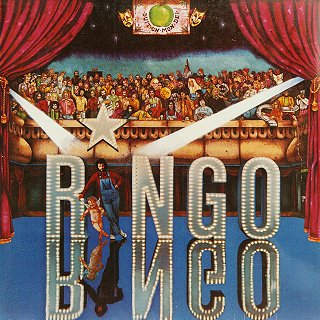 Following two long shots in 1970, Ringo limited himself to the occasional session between small parts in films for the better part of two years. He did release two singles, both of which were mid-wifed by George Harrison, but it wasn’t until early 1973 that he aimed again for the top of the pop charts. With Ringo, he was finally getting somewhere: a Richard Perry production that lived up to the support underneath, with help from the ex-Beatles (and all their solo studio friends, like Billy Preston, Nicky Hopkins, Jim Keltner, and Klaus Voormann), most of The Band, Marc Bolan, Harry Nilsson, Jack Nitzsche, and anyone else who happened to be in LA that week. The album spawned several hits, as the songs were finally worthy of an ex-Beatle.
Following two long shots in 1970, Ringo limited himself to the occasional session between small parts in films for the better part of two years. He did release two singles, both of which were mid-wifed by George Harrison, but it wasn’t until early 1973 that he aimed again for the top of the pop charts. With Ringo, he was finally getting somewhere: a Richard Perry production that lived up to the support underneath, with help from the ex-Beatles (and all their solo studio friends, like Billy Preston, Nicky Hopkins, Jim Keltner, and Klaus Voormann), most of The Band, Marc Bolan, Harry Nilsson, Jack Nitzsche, and anyone else who happened to be in LA that week. The album spawned several hits, as the songs were finally worthy of an ex-Beatle.The perfect opener came from John Lennon, and it’s the closest we got to a reunion in his lifetime, with George and Billy on the track too. “I’m The Greatest” would have sounded pompous in his mouth, but Ringo gives it precisely the ironic reading it needs. “Have You Seen My Baby” (or “Hold On”, according to the label) was from an older Randy Newman album, but it’s smacked aside by “Photograph”, co-written with George and possibly the greatest solo Beatles single ever. George himself contributed the jaunty “Sunshine Life For Me (Sail Away Raymond)”, where the backing is provided by everyone in The Band save Richard Manuel, plus David Bromberg on banjo and the other fiddle. The rockabilly favorite “You’re Sixteen” was another chart-topper, with a prominent Nicky Hopkins piano, Nilsson on several backing vocals, and Paul McCartney on “mouth sax”.
That’s a fairly solid album side, and side two starts strong with the guilty-pleasure infectious “Oh My My”, written by Ringo with new collaborator Vini Poncia and another hit single. However, he takes sole credit for “Step Lightly”, which is little more than an excuse to tap-dance. McCartney donated “Six O’Clock”, a lush production that’s musically and instrumentally better than just about everything on Red Rose Speedway. The synthesizer solo is still charming, and it’s nice to hear Paul singing with him again. Even Linda doesn’t get in the way. Unfortunately, “Devil Woman” is just plain noisy, and not to be confused with the Cliff Richard hit a few years away. (There’s even a reference to Sexy Sadie halfway through.) The big closer “You And Me (Babe)” is credited to George—those are definitely his chords—and Mal Evans, but it’s not very interesting until Ringo’s monologue thanking everybody.
The packaging for Ringo was also elaborate, from the Sgt. Pepper-style cover to the scary illustrated booklet and custom labels. All together, an extravaganza that proved Ringo could carry an album on his own, provided he had the right help. He would repeat the template over the coming decades, even using the all-star format for countless tours in the years that didn’t have an album to promote. (The CD adds to the value by including 1971’s “It Don’t Come Easy”, his second-greatest single, along with its flipside, the topical lament “Early 1970”, and “Photograph”’s B-side “Down And Out” for the completist.)
Ringo Starr Ringo (1973)—3½
1991 CD reissue: same as 1973, plus 3 extra tracks
No comments:
Post a Comment